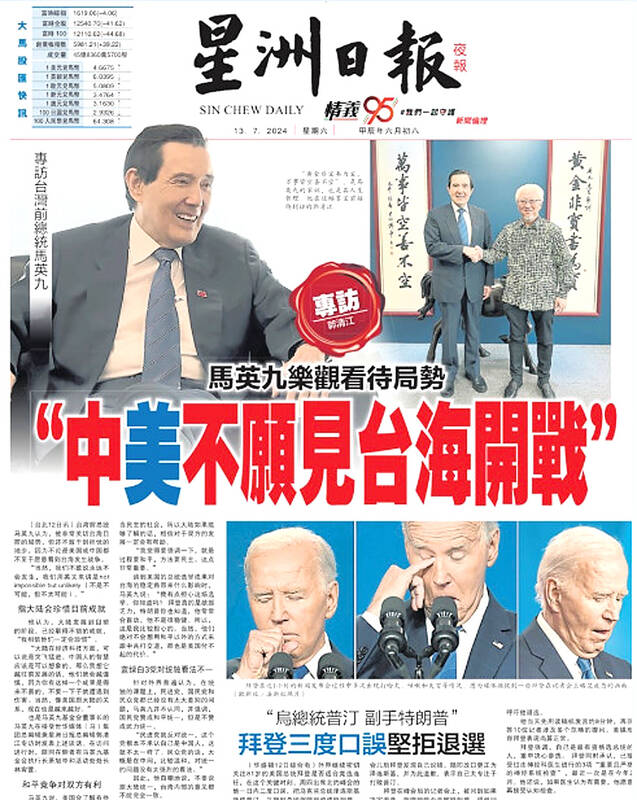The Chinese Nationalist Party (KMT) supports peaceful unification with China, and President William Lai (賴清德) is “a bit naive” for being a “practical worker for Taiwanese independence,” former president Ma Ying-jeou (馬英九) said in an interview published yesterday.
Asked about whether the KMT is on the same page as the Democratic Progressive Party (DPP) and the Taiwan People’s Party (TPP) on the issue of Taiwanese independence or unification with China, Ma told the Malaysian Chinese-language newspaper Sin Chew Daily that they are not.
While the KMT supports peaceful unification and is against unification by force, the DPP opposes unification as such and says they are not Chinese, he said, adding that the TPP takes a middle-of-the-road position, although it does not have a strong opinion on the issue.

Photo courtesy of Ma Ying-Jeou’s office
The KMT has not changed, and cannot change, its pro-unification stance on the Taiwan issue, as the Republic of China (ROC) Constitution does not exclude the option of unification, Ma said.
The KMT’s opposes Taiwanese independence and is in favor of “peace,” aligning with the opinion of the vast majority in Taiwan, he said.
Taiwanese who support independence are few, he added.
Ma said Tsai Ing-wen (蔡英文) is believed to be “more peaceable” than Lai.
“President Lai often proclaims himself as a pragmatic Taiwanese independence worker, but seeking Taiwanese independence is not pragmatic as it can never be achieved,” he said.
“That is why sometimes we think he is a bit naive,” Ma added.
Ma said he does not consider cross-strait tensions to be concerning for the moment, because neither the US nor China are willing to go to war.
“Of course, we dare not say it will never happen,” he said, adding that it is “not impossible, but unlikely.”
He also said he believes China “cherishes” its economic and technological achievements, so it would not rush into a war.
“I am not that pessimistic about the US-China relationship,” Ma said, adding that he believes both sides know war would lead to a lose-lose situation.
Peaceful competition between the US and China could benefit both sides, as the US would not stay ahead of China forever in some fields, he said.
China would not rashly wage a war against Taiwan as Chinese President Xi Jinping (習近平) knows that there are millions of Taiwanese businesspeople in China and Taiwanese would not accept it if China does not adopt a peaceful and democratic approach to achieve unification, Ma said.
Asked about the potential impact of this year’s US presidential election on cross-strait stability, Ma said he is concerned.
However, neither US President Joe Biden, nor Republican presidential candidate and former president Donald Trump would deal with China by any means other than peaceful, as the US could not afford the price of war, he said.

SHIPS, TRAINS AND AUTOMOBILES: The ministry has announced changes to varied transportation industries taking effect soon, with a number of effects for passengers Beginning next month, the post office is canceling signature upon delivery and written inquiry services for international registered small packets in accordance with the new policy of the Universal Postal Union, the Ministry of Transportation and Communications said yesterday. The new policy does not apply to packets that are to be delivered to China, the ministry said. Senders of international registered small packets would receive a NT$10 rebate on postage if the packets are sent from Jan. 1 to March 31, it added. The ministry said that three other policies are also scheduled to take effect next month. International cruise ship operators

HORROR STORIES: One victim recounted not realizing they had been stabbed and seeing people bleeding, while another recalled breaking down in tears after fleeing A man on Friday died after he tried to fight the knife-wielding suspect who went on a stabbing spree near two of Taipei’s busiest metro stations, Taipei Mayor Chiang Wan-an (蔣萬安) said. The 57-year-old man, identified by his family name, Yu (余), encountered the suspect at Exit M7 of Taipei Main Station and immediately tried to stop him, but was fatally wounded and later died, Chiang said, calling the incident “heartbreaking.” Yu’s family would receive at least NT$5 million (US$158,584) in compensation through the Taipei Rapid Transit Corp’s (TRTC) insurance coverage, he said after convening an emergency security response meeting yesterday morning. National

PLANNED: The suspect visited the crime scene before the killings, seeking information on how to access the roof, and had extensively researched a 2014 stabbing incident The suspect in a stabbing attack that killed three people and injured 11 in Taipei on Friday had planned the assault and set fires at other locations earlier in the day, law enforcement officials said yesterday. National Police Agency (NPA) Director-General Chang Jung-hsin (張榮興) said the suspect, a 27-year-old man named Chang Wen (張文), began the attacks at 3:40pm, first setting off smoke bombs on a road, damaging cars and motorbikes. Earlier, Chang Wen set fire to a rental room where he was staying on Gongyuan Road in Zhongzheng District (中正), Chang Jung-hsin said. The suspect later threw smoke grenades near two exits

The Forestry and Nature Conservation Agency yesterday launched a gift box to market honey “certified by a Formosan black bear” in appreciation of a beekeeper’s amicable interaction with a honey-thieving bear. Beekeeper Chih Ming-chen (池明鎮) in January inspected his bee farm in Hualien County’s Jhuosi Township (卓溪) and found that more than 20 beehives had been destroyed and many hives were eaten, with bear droppings and paw prints near the destroyed hives, the agency said. Chih returned to the farm to move the remaining beehives away that evening when he encountered a Formosan black bear only 20m away, the agency said. The bear